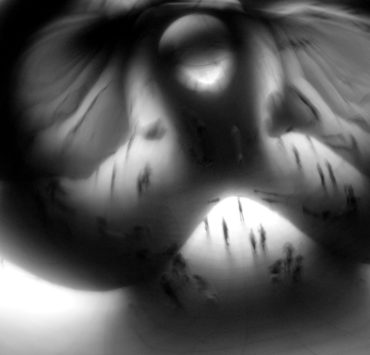
“Get the fuck out of my house,” she said levelly. Asperger conspired with Nazis. Your misunderstanding of this episode brought to you by the Third Reich . . .
“You’re just a dumb nigger.”
SPECTRUM. “Get the fuck—.” He had already gone, jerking the kitchen door shut behind him. She stood at the door staring toward the street, but her eyes drifted immediately. Not to the empty quiet place outside where he had driven away in his pickup, but to a copse of trees she knew thirty miles outside of town, the spot in the woods where she had first suspected him tender. Drift.
I’m ’on find me a razor blade and lay Reuben in the shade, start me a graveyard of my own.
Oh me, oh Lordy, my. Start me a graveyard of my own.
At night, when the light’s on in the kitchen, the window in the kitchen door becomes a mirror.
He scuttled, shoving the last of his clothes into an old military surplus duffel bag, down the kitchen steps toward the truck. EPISODE: a flat green cue card with white lettering in her mind. She might have laughed, except the doppelgänger added, “You’re dead. You’re fucking dead.”
She might have laughed.
Even the cursor gets lost when it hits the doppelgänger. How do you parse that? An unmarked spot on the page where the flashing stops. The whole line disappears. You’re left. In a borderless area. A site you want to label 1944 regardless however nothing’s for you there. Nothing safe for you regardless however here the walls have fallen. Find the pediatrician and maybe you can get somewhere. Blink, blink, blink. The cursor’s the edge of an open door. Then it’s gone.
Later when she sees herself reflected in the closed door, she’ll recognize the room. “Fi?” She’ll ask her mirrored self, “Fiona?”
“You’re so stupid; when the fascists come they’re going to kill you first.”
Ol’ Reuben made a train, he put it on a track, and he ran it to the Lord knows where.
Oh me, oh Lordy my, he ran it to the Lord knows where.
She’d followed him deep into the pines. “Les, where are we going?” He had not smiled but she’d been able to tell by the way he carried himself that he was pleased, by his determined stride ahead of her in the forest; by the way he rubbed his hands together. Stimming. Fiona tapped her chin, mouthed the lyrics of an old-time tune on repeat. She loved the smell of the pine trees, the cushiony feel of the fallen needles under her hiking boots, how they made an umber carpet almost the same color as his beard.
“I love it out here.”
“We used to play back here all the time when I was a kid,” Les had said.
“It’s so soft.” She’d stomped the ground, then hopped once. Then again. A little hop.
“The mycelium’s pulling energy from our footsteps,” he’d said.
“Say mycelium again and watch what happens.”
Something about his eyes reminded her of a bird of prey. They flashed green and watchful. “Your eyes twinkle when you’re happy,” she’d said. She’d reached up to scratch his beard and he’d hugged her, wrapping her for a moment in his camouflage army jacket. Drift.
How had people who’d escaped from slavery done it? Fiona glanced back over her shoulder. No trail, no visible path revealed the route they’d just taken from Les’s father’s cabin. They’d gone far enough that the house was no longer visible. She could not escape a long history of the need for escape, never felt far enough removed. Strange in 2017, though not strange enough. She had not shared the thought with Les. He’d marched ahead of her through the forest. Had they lived in a different time, could he have been someone she trusted?
What made him someone she could trust in 2017? She’d met him two years ago in the garden section at Agway, where he’d been buying plants for a customer’s garden project. She’d felt drawn to him because he cared for plants and trees. In the woods, he’d stopped and turned to wait for her. She’d tripped over a root and she’d caught him giving her a look he often levelled at her lately, as if he were surprised she’d survived her own life for this long. His eyes had narrowed like a hawk’s. She’d read no bemusement on his face. Only concern, concentration. Had she seen a tinge of anger? Turning aside, he’d gestured with his chin. “Look.” There decaying in the forest sat a ’56 Cadillac Fleetwood Sixty Special.
My love, my love, what have I done to make you treat me so?
You caused me to weep. You caused me to moan.
You caused me to leave my home . . .
You’re between periods. Snagged in a set of lyrics, you lament. A set of imperatives cost lives. Call them 1944. You must delineate, not hint at history. Else what? Of your life?
“You are the WORST person I have ever been with, and that’s saying something!”
Fiona recognizes the world she spies in the kitchen door reflection as somewhere inaccessible, the woman she sees there—impossibly younger-looking, long-lashed and doe-eyed, eyebrows raised slightly in an expression of surprise—how had that hapless woman indeed not found herself the subject of some regrettable, forgettable headline? A banal and violent tragedy? A disappearance? “ . . . the colors and the lines that trace the past / will in the semidarkness form a face . . .”
“For once, then, something.” Lines from two poems, the first, Borges, the second, Frost, occur to her, and for the umpteenth time she makes a mental note: replace the door with a Dutch door that will open at the top while remaining shut at the bottom. And for the umpteenth time, just after, she feels a shiver of dread at the thought of a bird flying into the house. A bad omen. She opens the refrigerator and stares blankly at the contents of that lit-up little box. How had she fallen in love with death?
“You’re just a dumb nigger.”
SPECTRUM. “Get the fuck—.” He had already gone, jerking the kitchen door shut behind him. She stood at the door staring toward the street, but her eyes drifted immediately. Not to the empty quiet place outside where he had driven away in his pickup, but to a copse of trees she knew thirty miles outside of town, the spot in the woods where she had first suspected him tender. Drift.
I’m ’on find me a razor blade and lay Reuben in the shade, start me a graveyard of my own.
Oh me, oh Lordy, my. Start me a graveyard of my own.
At night, when the light’s on in the kitchen, the window in the kitchen door becomes a mirror.
He scuttled, shoving the last of his clothes into an old military surplus duffel bag, down the kitchen steps toward the truck. EPISODE: a flat green cue card with white lettering in her mind. She might have laughed, except the doppelgänger added, “You’re dead. You’re fucking dead.”
She might have laughed.
Even the cursor gets lost when it hits the doppelgänger. How do you parse that? An unmarked spot on the page where the flashing stops. The whole line disappears. You’re left. In a borderless area. A site you want to label 1944 regardless however nothing’s for you there. Nothing safe for you regardless however here the walls have fallen. Find the pediatrician and maybe you can get somewhere. Blink, blink, blink. The cursor’s the edge of an open door. Then it’s gone.
Later when she sees herself reflected in the closed door, she’ll recognize the room. “Fi?” She’ll ask her mirrored self, “Fiona?”
“You’re so stupid; when the fascists come they’re going to kill you first.”
Ol’ Reuben made a train, he put it on a track, and he ran it to the Lord knows where.
Oh me, oh Lordy my, he ran it to the Lord knows where.
She’d followed him deep into the pines. “Les, where are we going?” He had not smiled but she’d been able to tell by the way he carried himself that he was pleased, by his determined stride ahead of her in the forest; by the way he rubbed his hands together. Stimming. Fiona tapped her chin, mouthed the lyrics of an old-time tune on repeat. She loved the smell of the pine trees, the cushiony feel of the fallen needles under her hiking boots, how they made an umber carpet almost the same color as his beard.
“I love it out here.”
“We used to play back here all the time when I was a kid,” Les had said.
“It’s so soft.” She’d stomped the ground, then hopped once. Then again. A little hop.
“The mycelium’s pulling energy from our footsteps,” he’d said.
“Say mycelium again and watch what happens.”
Something about his eyes reminded her of a bird of prey. They flashed green and watchful. “Your eyes twinkle when you’re happy,” she’d said. She’d reached up to scratch his beard and he’d hugged her, wrapping her for a moment in his camouflage army jacket. Drift.
How had people who’d escaped from slavery done it? Fiona glanced back over her shoulder. No trail, no visible path revealed the route they’d just taken from Les’s father’s cabin. They’d gone far enough that the house was no longer visible. She could not escape a long history of the need for escape, never felt far enough removed. Strange in 2017, though not strange enough. She had not shared the thought with Les. He’d marched ahead of her through the forest. Had they lived in a different time, could he have been someone she trusted?
What made him someone she could trust in 2017? She’d met him two years ago in the garden section at Agway, where he’d been buying plants for a customer’s garden project. She’d felt drawn to him because he cared for plants and trees. In the woods, he’d stopped and turned to wait for her. She’d tripped over a root and she’d caught him giving her a look he often levelled at her lately, as if he were surprised she’d survived her own life for this long. His eyes had narrowed like a hawk’s. She’d read no bemusement on his face. Only concern, concentration. Had she seen a tinge of anger? Turning aside, he’d gestured with his chin. “Look.” There decaying in the forest sat a ’56 Cadillac Fleetwood Sixty Special.
My love, my love, what have I done to make you treat me so?
You caused me to weep. You caused me to moan.
You caused me to leave my home . . .
You’re between periods. Snagged in a set of lyrics, you lament. A set of imperatives cost lives. Call them 1944. You must delineate, not hint at history. Else what? Of your life?
“You are the WORST person I have ever been with, and that’s saying something!”
Fiona recognizes the world she spies in the kitchen door reflection as somewhere inaccessible, the woman she sees there—impossibly younger-looking, long-lashed and doe-eyed, eyebrows raised slightly in an expression of surprise—how had that hapless woman indeed not found herself the subject of some regrettable, forgettable headline? A banal and violent tragedy? A disappearance? “ . . . the colors and the lines that trace the past / will in the semidarkness form a face . . .”
“For once, then, something.” Lines from two poems, the first, Borges, the second, Frost, occur to her, and for the umpteenth time she makes a mental note: replace the door with a Dutch door that will open at the top while remaining shut at the bottom. And for the umpteenth time, just after, she feels a shiver of dread at the thought of a bird flying into the house. A bad omen. She opens the refrigerator and stares blankly at the contents of that lit-up little box. How had she fallen in love with death?
This is an excerpt. Finish reading “Tender” in The Ferrante Project issue, available for purchase here.
Image Credits: Freddy Fehmarn
Anonymous
The Ferrante Project: A collective of 16 women writers of color experimenting with freedom, anti-fame, and anonymity. Contributors include: Cathy Linh Che, Angie Cruz, Natalie Díaz, Ru Freeman, Sarah Gambito Cristina García, Jamey Hatley, Dawn Lundy Martin, Ayana Mathis, Vi khi nao, Aimee Nezhukumatathil, Deborah Paredez, Khadijah Queen, Emily Raboteau, Paisley Rekdal, and Lyrae Van Clief- Stefanon.







